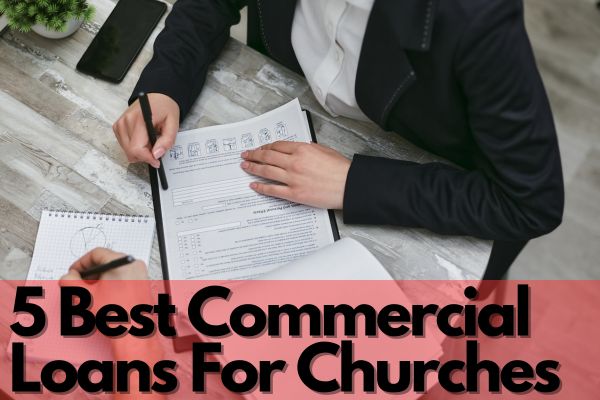Religious institutions, such as churches, play an important role in communities by providing social services, education, and spiritual guidance. However, maintaining and operating a church can be a significant financial burden.
Governments may offer loans and grants to nonprofit organizations, including religious organizations, to support these institutions. While it is important to consider the legal and constitutional implications of government funding for religious institutions, it is worth exploring the potential opportunities available.
This article will discuss 10 government loans for churches and important considerations for applying and utilizing such funding.
By exploring these options, churches may be able to serve their communities better and maintain their physical infrastructure.
10 Government Loans For Churches
1. Small Business Administration (SBA) Loans
SBA offers several loan programs for small businesses, including nonprofits.
Religious organizations, including churches, may be eligible for the SBA’s 7(a) Loan Program, which provides loans of up to $5 million for various purposes, including working capital, equipment, and property.
2. Community Facilities Direct Loan and Grant Program
The U.S. Department of Agriculture (USDA) offers this program to support rural communities by financing essential community facilities.
Religious organizations, including churches, may be eligible for loans and grants to construct, renovate, or purchase facilities.
3. New Markets Tax Credit (NMTC) Program
This program provides tax credits for investments in low-income communities. Religious organizations, including churches, may be eligible to receive investments to finance projects in these communities.
4. Historic Preservation Fund
The National Park Service provides grants to preserve historic properties. Religious organizations, including churches, may be eligible for grants to maintain and repair historic church buildings.
5. Environmental Protection Agency (EPA) Brownfields Grants
The EPA offers grants to assess and clean up contaminated properties, including former industrial or commercial sites.
Religious organizations, including churches, may be eligible for these grants if they own or operate such properties.
6. Department Of Housing And Urban Development (HUD) Community Development Block Grants (CDBG)
This program provides grants to support community development projects, including infrastructure and housing improvements.
Religious organizations, including churches, may be eligible for grants to support community development in low-income areas.
7. Emergency Management Performance Grants (EMPG)
The Federal Emergency Management Agency (FEMA) provides grants to support emergency management preparedness and response.
Religious organizations, including churches, may be eligible for these grants to improve emergency preparedness.
8. Department Of Justice (DOJ) Grants
The DOJ provides grants to support criminal justice programs, victim services, and other initiatives.
Religious organizations, including churches, may be eligible for grants to support these programs in their communities.
9. National Endowment For The Humanities (NEH) Preservation Assistance Grants
NEH provides grants to help small and mid-sized institutions improve their ability to preserve and care for their humanities collections.
Religious organizations, including churches, may be eligible for these grants to preserve historical documents or artifacts.
10. Department Of Education Grants
The Department of Education grants support education programs, including literacy and after-school programs.
Religious organizations, including churches, may be eligible for grants to support community education programs.
It is important to note that eligibility for these programs may vary based on specific criteria and requirements. Additionally, additional government loans and grants may be available to religious organizations not listed here.
Steps On How To Apply For Church Loan
Applying for a church loan can be a complex process. However, here are some broad steps that may help guide the application process:
1. Determine The Church’s Financial Needs
Before applying for a loan, it is important to determine the specific financial needs of the church. This includes assessing the current financial situation, identifying the project or purpose of the loan, and determining the amount of funding needed.
2. Research Loan Options
Research available loan options from various lenders, including banks, credit unions, and government programs. It is important to compare loan terms, interest rates, and eligibility requirements to find the best fit for the church’s needs.
3. Prepare The Application
The application process may vary depending on the lender or loan program. Typically, the application will require information about the church’s financial history, including tax returns, financial statements, and other documentation.
4. Develop A Business Plan
Lenders may require a business plan that outlines the purpose of the loan, how the funds will be used, and how the church plans to repay the loan. The business plan should include projected income and expenses and a repayment plan.
5. Gather Supporting Documentation
Supporting documentation may include financial statements, tax returns, church bylaws, articles of incorporation, and any other relevant documentation.
6. Apply
Once the application and supporting documentation have been completed, submit them to the lender or loan program. It is important to follow up with the lender to ensure that all required information has been received.
7. Review Loan Terms
Once the application has been reviewed, the lender will provide the church with loan terms, including the interest rate, repayment schedule, and any fees or penalties.
8. Accept Or Decline The Loan
After reviewing the loan terms, the church can accept or decline the loan. If the loan is accepted, the church must sign a loan agreement and begin repayment according to the agreed-upon terms.
It is important to note that the loan application process may vary depending on the lender or loan program.
It is important to research and understand the specific requirements and regulations associated with each loan option and to consult with legal and financial experts to ensure compliance.
General Steps On How To Apply For The Loan
Here are the general steps to apply for a church loan:
1. Determine Your Financing Needs
The first step in applying for a church loan is determining your financing needs.
This may include identifying the type of loan you need, such as construction, renovation, or debt refinancing, and determining the amount of funding you require.
2. Research Lenders
Once you know your financing needs, you should research potential lenders specializing in lending to churches. This may involve reviewing their eligibility criteria, interest rates, fees, and terms and conditions.
3. Gather The Required Documents
Before applying for a loan, you must gather the required documentation, including financial statements, tax returns, bank statements, and other financial records.
Reviewing the lender’s application requirements and gathering all necessary documents in advance is important.
4. Complete The Loan Application
Once you have identified a lender and gathered the required documentation, you can begin the loan application process.
This may involve completing an online application or submitting a paper application.
5. Provide Additional Information
After submitting the loan application, the lender may request additional information or documentation to support your loan request.
This may include a detailed project plan, cost estimates, and collateral information.
6. Review Loan Offer
If your loan application is approved, the lender will provide a loan offer that outlines the loan terms, interest rate, fees, and repayment schedule.
Reviewing the loan offer carefully and asking questions before accepting the loan is important.
7. Close The Loan
Once you accept the loan offer, you must complete the loan closing process. This may involve signing loan documents, providing additional information, and paying closing costs or fees.
Why The Church Loan Is Important
Here are some potential benefits of taking out a loan for a church:
1. Facilitates Church Growth And Development
A loan can provide funding for church projects, such as the construction of new facilities, the renovation of existing ones, or the purchase of equipment.
This can help the church grow and develop its ministries and outreach efforts.
2. Provides Stability And Security
A loan can help churches stabilize their finances by providing a predictable funding source. This can help churches weather financial challenges and ensure their continued operation.
3. Expands Community Outreach
With the help of a loan, churches can expand their community outreach efforts by funding programs and services that benefit local residents. This can help churches build relationships with their communities and fulfill their missions.
4. Attracts New Members
Investing in the church’s facilities and programs can help attract new members and retain existing ones. A loan can help churches create welcoming and attractive environments encouraging people to become involved in their ministries.
5. Builds Credit History
Taking out a loan and making timely payments can help churches build their credit history. This can make it easier for them to obtain financing in the future and negotiate better loan terms.
6. Enables Effective Financial Management
A loan can help churches manage their finances more effectively by providing predictable payments and repayment schedules. This can help churches avoid cash flow problems and other financial challenges.
7. Allows Churches To Fulfill Their Mission
A loan can help churches fulfill their mission and serve their congregations and communities more effectively by providing funding for important projects and initiatives.
Conclusion
Obtaining a loan can be an important tool for churches to fund important projects and fulfill their missions.
From financing facility renovations to expanding community outreach efforts, a loan can provide the funding and stability that churches need to grow and thrive. By following the proper steps to apply for a loan, churches can ensure they get the best possible terms and comply with all regulations.
Ultimately, the benefits of a church loan can extend far beyond the financial realm, enabling churches to create welcoming environments, attract new members, and positively impact their communities.





